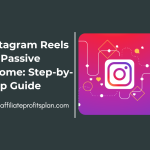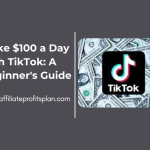Welcome to my article “How to Get Approved for Top Affiliate Programs: Tips for Beginners.”Affiliate marketing is one of the most popular ways to make money online, and it’s no surprise why. After all, who wouldn’t want to earn a passive income by promoting products they believe in? However, if you’re a beginner, getting your foot in the door with top affiliate programs can feel like trying to get into an exclusive club with a strict bouncer at the door. It’s not just about signing up; you need to prove you’re a worthy affiliate partner. But don’t worry—getting approved for top affiliate programs isn’t as mysterious as it sounds. With the right approach, you can unlock the doors to affiliate marketing success.
In this guide, we’ll walk you through practical tips and strategies to help you get your application to the “approved” pile, not the dreaded “rejected” bin. From understanding the program’s requirements to building a website that makes you look like a pro (even if you’re still figuring out what a widget is), we’ve got you covered. Think of this as your VIP pass to the affiliate world—no velvet ropes, no secret handshakes, just a few steps that will help you get noticed and increase your chances of approval. So, let’s dive into how you can become a sought-after affiliate and start earning those sweet commissions!
Access Our Proven Tested Formula for $50-$100 Daily Income – Watch This FREE Video >>

Understand the Requirements of Top Affiliate Programs
Before you start clicking “apply” like a caffeinated squirrel, it’s crucial to understand what top affiliate programs are actually looking for. Spoiler alert: it’s not just your charm (though we’re sure you have plenty of that). Most affiliate programs have specific requirements to ensure that their partners are a good fit for their brand and can drive quality traffic to their offers. Knowing these requirements ahead of time will help you avoid the heartache of an unexpected rejection.
First, let’s talk about the basics: what exactly do you need to get started? Most programs will want you to have a website or a blog. While you might think posting a link on your social media accounts will cut it, that’s not always the case. Top-tier affiliate programs are looking for a professional, content-rich website that reflects your niche. And by “content-rich,” I don’t mean posting random memes (as much as we all love them). You’ll need high-quality, informative content that speaks to your audience and adds value. Programs want to know that you’re capable of engaging potential customers, not just throwing links around like confetti.
Additionally, don’t expect to apply without understanding the program’s terms and conditions. Yes, I know, reading the fine print isn’t the most exciting activity, but it’s essential. Some programs may have restrictions on how you can promote their products—whether through paid ads, social media posts, or email marketing. Others might require a minimum level of traffic before accepting you. Understanding these rules upfront will save you from wasting time and, more importantly, from being caught off guard later on.
Lastly, top programs love affiliates who are transparent. You don’t have to be an influencer with millions of followers (yet), but being honest about where your traffic comes from, how you’ll promote products, and your audience demographics will make you seem like a trustworthy partner. So, before you apply, make sure you meet the program’s basic criteria, have a website ready to show off, and most importantly, have a clear plan on how you’ll help them grow their brand. Once you check all those boxes, you’ll be in prime position to get approved and start earning commissions.
Build a High-Quality, Niche-Specific Website or Blog
Let’s be real—if you’re trying to get into top affiliate programs, your website or blog isn’t just a digital business card. It’s your first impression, your resume, and your virtual handshake all rolled into one. So, if you want to get the attention of the best affiliate programs, it needs to be top-notch, niche-specific, and—most importantly—not look like it was slapped together in an afternoon. You wouldn’t wear flip-flops to a job interview (unless you’re applying to a beach resort), so don’t treat your website like an afterthought.
First things first: pick a niche. Affiliate programs are all about finding the right match, and that starts with narrowing down your focus. Whether it’s fitness, personal finance, tech gadgets, or vegan recipes, a clear niche will help you attract the right audience and, in turn, the right affiliate programs. A broad, “everything-for-everyone” site might seem tempting, but it’s like trying to be a jack-of-all-trades and a master of none. You want to specialize so that you become an authority in that area. Trust me, a website focused on organic skincare will attract the attention of the best beauty-related affiliate programs way faster than one that also covers gardening tips and conspiracy theories (unless, of course, you’re in the conspiracy skincare business, which, hey, you do you).
Once you’ve nailed your niche, let’s talk about content—because that’s the heart and soul of any high-quality website. If your content is thin, rushed, or riddled with spelling errors, it’s not going to impress affiliate programs, or anyone else for that matter. Your blog posts should be informative, engaging, and relevant to your audience. Focus on offering value in every piece of content, whether it’s a well-researched how-to guide, an in-depth product review, or a personal story that resonates with your readers. Consistency is key, too. If you post once and disappear, it won’t take long for people (and affiliate programs) to forget about you.
Finally, make your website user-friendly. A cluttered, slow-loading website is like walking into a messy store with no signs. People will just leave. Ensure your site has a clean design, easy navigation, and fast load times. And don’t forget about mobile optimization—more than half of all web traffic comes from mobile devices these days, so if your site doesn’t look great on a phone, you’re losing potential visitors (and affiliate sales). With all these elements in place, your website will be in prime shape for attracting affiliate programs that are eager to partner with a polished, niche-focused, content-driven site like yours.
Remember, this is your digital storefront—make it count!
Create a Strong Online Presence and Reputation
Alright, here’s the thing: getting approved for top affiliate programs isn’t just about having a pretty website or a flashy logo—it’s also about building a reputation that makes affiliate managers want to hand you the keys to the kingdom. Think of it like trying to get into a cool club; if the bouncer doesn’t know you, or if you haven’t proven you’re a regular in the scene, he’s not letting you in. But if you’ve got a solid online presence and a reputation for being trustworthy and engaging, you’ll be on the VIP list in no time.
So, how do you build this online rep? The first step is to be active on social media. This doesn’t mean randomly posting inspirational quotes about “hustling” or pictures of your lunch (unless you’re an influencer in the food niche, then go for it). Instead, it’s about showing up consistently on platforms like Instagram, Twitter, LinkedIn, or Facebook where your target audience hangs out. Engage with them by sharing valuable content, answering questions, and joining conversations. You want to be seen as an expert who’s approachable and invested in the community, not just someone out there pushing affiliate links. Think of your social media as an extension of your brand where you nurture relationships, not just broadcast promotions.
Access Our Proven Tested Formula for $50-$100 Daily Income – Watch This FREE Video >>
Next, build trust with your audience by offering real value. Don’t just slap a bunch of affiliate links on your blog and call it a day. Top affiliate programs want to see that you have an engaged audience who trusts your recommendations. That means creating content that educates, entertains, or solves problems for your readers. Whether it’s product reviews, tutorials, or personal experiences, make sure your content resonates with your followers and positions you as a go-to resource in your niche. When your audience knows you’re giving them honest, helpful advice, they’re more likely to click through on your affiliate links—and the affiliate programs will notice that.
And don’t forget about online reputation management. This might sound like something reserved for major corporations, but as an affiliate marketer, your reputation is everything. Respond to comments, engage with feedback, and handle any criticism with grace. If a customer has a bad experience with a product you’re promoting, address it quickly and transparently—this will show both your audience and potential affiliate partners that you’re a responsible and trustworthy marketer. And as much as we’d love to think everyone on the internet is super friendly, the reality is that negative reviews or bad press can hurt your chances with high-quality programs, so keep things professional and proactive.
Finally, network and collaborate with other influencers, content creators, or affiliates in your niche. Not only does this help expand your reach, but it also builds your credibility. When people see that you’re working with respected brands or personalities, they’ll take you more seriously. It’s like getting a recommendation from a trusted friend—if others vouch for you, you’ll instantly look more reputable.
To sum it up: A strong online presence and reputation aren’t built overnight, but they’re worth the effort. Be active, be helpful, and be transparent, and soon you’ll find yourself not just getting approved by top affiliate programs, but actually thriving with them.
Provide Proof of Previous Success or Traffic
Here’s the deal: affiliate programs aren’t just looking for anyone to promote their products—they want winners. If you want to prove you’re the right affiliate for the job, you need to show that you’ve got what it takes to drive traffic, make sales, and essentially keep the affiliate wheels turning. Think of it like a job interview; if you’ve got past experience or a portfolio of success, you’re more likely to land the gig. But how do you show these affiliate programs that you’re a pro (or at least a fast learner)? Simple—prove it!
If you’ve already been working in affiliate marketing (or anything remotely related), make sure to highlight your previous successes. This could include things like your conversion rates, how much revenue you’ve generated, or even the total number of clicks or leads you’ve brought in. Don’t be shy—share your stats. Affiliate programs love seeing tangible proof that you know how to make things happen. A screenshot of your Google Analytics showing consistent traffic growth or a report of affiliate sales you’ve made is like a golden ticket for approval. Bonus points if you can showcase how your marketing efforts led to a spike in conversions or if you’ve successfully promoted similar products before. It’s like saying, “Hey, I’ve done this before, and I can do it again for you!”
But wait, you’re a beginner and don’t have a track record yet? No problem—you’ve still got options. If you’re just starting out and don’t have solid affiliate marketing metrics to show off yet, lean into your current content and audience. Focus on the quality of your website and traffic. For example, if you’ve got a blog that’s consistently getting a good amount of organic traffic, even if it’s still growing, make sure to mention that. Use tools like Google Analytics to show how your traffic is increasing over time. Affiliate programs will be impressed if you can demonstrate that you’re working on scaling your traffic and have a clear path for growth.
Another way to show potential is by highlighting your engagement levels. A smaller audience doesn’t mean you’re not capable of driving conversions. If you’ve built a solid email list or have an active following on social media, show how engaged your audience is with your content. For example, if you’ve got a highly engaged Facebook group or a Twitter account where people constantly interact with your posts, mention that! Engagement can often be a more accurate measure of an affiliate’s potential than sheer traffic volume. It shows that when you recommend something, people are listening.
Finally, if you’re really new to the game, consider building a case study or even a mini-portfolio of how you plan to promote the affiliate program. While it’s not technically “proof” of success yet, a well-thought-out strategy and clear explanation of how you intend to drive traffic and make sales can go a long way. Affiliate programs want to know that you have a plan—and if you can articulate that plan well, you’ll boost your chances of approval, even if you don’t have a history of success yet.
In short: Whether you’ve got a long history of affiliate marketing wins or you’re just getting started, proof matters. Show the affiliate programs you’re applying to that you have the drive, the traffic, and the strategy to succeed—and you’ll be well on your way to getting approved.
Apply to Multiple Affiliate Programs and Be Patient
Here’s the hard truth—getting into the top affiliate programs isn’t always a walk in the park. Even if your website is polished, your content is on point, and your traffic is growing, there’s no guarantee that every program you apply to will accept you right away. It’s a numbers game, and sometimes you’ve got to put in the effort and cast a wide net before you reel in a big one. So, what do you do? Apply to multiple programs, of course! And no, this isn’t about desperately throwing applications around like confetti—it’s about strategically positioning yourself to increase your chances of getting approved.
Think of it this way: just like with job applications, not every employer will be the right fit for you—and vice versa. The same goes for affiliate programs. You may apply to five different programs, and one might reject you, another might be a perfect match, and the others might take a little longer to respond. By applying to multiple programs, you’re maximizing your opportunities. The more you apply, the higher your chances of getting accepted. But don’t just apply to any program that comes your way—do your research. Choose affiliate programs that align with your niche, audience, and values. You don’t want to end up promoting products you don’t believe in or that don’t resonate with your followers. Quality over quantity still applies here.
But here’s where the patience part comes in. After sending in your applications, don’t expect an instant approval—and definitely don’t start second-guessing your strategy after a few days. Affiliate program managers get tons of applications, so it can take time for them to review and respond to each one. While waiting, resist the urge to bombard them with follow-up emails. Trust me, the last thing you want to do is look like you’re desperate (even if you are, a little). Instead, use this waiting period to focus on growing your website and enhancing your content. Keep adding value for your audience, improve your SEO, and maybe even try out new ways to drive traffic. The more you refine your website, the better your chances will be when an affiliate manager finally takes a look at your application.
And don’t get discouraged if some programs don’t respond or don’t accept you right away. Rejection is just part of the process—it’s not a reflection of your ability or potential. Some programs may have very high standards, or they may not be looking for affiliates in your niche at the moment. Others might simply be swamped with applications. That’s where patience comes in. Keep applying, keep improving, and keep showing up for your audience. Eventually, you’ll land the right affiliate partnerships that will be a perfect fit for you and your audience. And when you do, it will be all the sweeter because you know you’ve earned it.
In the world of affiliate marketing, persistence is key. So apply to multiple programs, play the numbers game, and while you’re at it—sit back, relax, and let your growing website work its magic. After all, good things come to those who wait (and hustle).
Conclusion: Stay Consistent and Keep Improving
Alright, we’ve covered a lot of ground here, and if you’re still reading, I’m guessing you’re feeling pretty motivated to start applying to affiliate programs and get that sweet commission rolling in. But before you rush off to hit “apply,” let me hit you with the most important piece of advice in affiliate marketing: consistency is your best friend. It’s easy to get discouraged if you don’t see instant results, but success in affiliate marketing is a marathon, not a sprint. You’ll need to keep showing up, keep learning, and keep improving if you want to build a solid foundation for long-term success.
Consistency means posting regular, high-quality content, staying engaged with your audience, and consistently applying to affiliate programs that align with your goals. It also means continuously refining your strategies—whether it’s tweaking your website, optimizing your SEO, or finding new ways to drive traffic. Affiliate marketing isn’t a one-time setup and forget-it kind of deal. It’s an ongoing process of testing, adjusting, and scaling. Don’t get discouraged by slow starts or setbacks; just keep putting in the work, and the results will follow.
Access Our Proven Tested Formula for $50-$100 Daily Income – Watch This FREE Video >>
But here’s the secret: improvement is where the magic happens. The digital landscape is always shifting, and so should your approach. Keep learning—whether it’s through reading blogs, watching tutorials, or experimenting with new tools. The affiliate programs that are top-tier today might not be the same tomorrow, and the strategies that worked last year might need tweaking for today’s market. Always keep your finger on the pulse of trends, tech, and tactics. Your affiliate marketing game will only improve when you stay curious and committed to refining your methods.
Finally, remember that every rejection is just a stepping stone to success. Keep refining your website, tweaking your traffic-driving strategies, and building your reputation. And every time you apply to an affiliate program, you’re one step closer to finding the perfect partnerships. The key is to stay the course, even when it feels like progress is slow. By staying consistent and always looking for ways to improve, you’ll soon find that affiliate marketing isn’t just a way to make money—it’s a journey of growth, learning, and, yes, a little hustle. So, keep at it, and before you know it, you’ll be reaping the rewards.
Thanks a lot for reading my article on “How to Get Approved for Top Affiliate Programs: Tips for Beginners” till the end. Hope you’ve helped. See you with another article.










